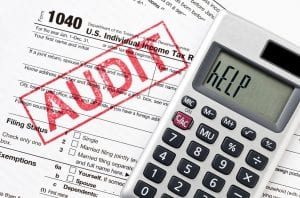
Will your small business be audited? If you want to send a small business owner’s blood pressure soaring just tell them they’re being audited. Even if they have all their documentation and they’re ready to defend deductions and support their income, the audit process is still enough to drive people crazy. So will get audited this year?
If we had a crystal ball at RJS LAW and we could accurately predict which business owner will get audited, we’d be well on our way to retiring on our own private island. There’s just no way to know for certain but there are some common red flags and we can look at the IRS data to see trends that show the frequency of audits by return types.In 2012 there were more than 143 million individual income tax returns filed, and 1% of these returns were audited that year.But those numbers change dramatically when it comes to business returns and the odds of being audited increase exponentially.
Deductions taken on the Schedule C Income and Expense forms seem to be the most common triggers and income levels play an important role. Business owners with a Schedule C list of gross receipts under $25,000 had odds of just 1.2% of being audited. By the time gross income reaches $100,000, the odds tripled to 3.6% and if your corporate income is over a million, you have a 12% chance of being audited. Realistically, if your gross income is over 1-million, you should come talk to us about incorporation options to lower both your audit risks, potentially lower tax rates and liability limitations.
Compare that to large corporations. Your odds of being audited are 17% if you have income over 10-million and pretty much every company over 1-billion in revenue will face an annual audit. These statistics relate to the pick of the draw for random audits. But yours may be hand selected for further examination.Here are some reasons why:
1. Mismatch of income to 1099 totals. If you receive a 1099 from your client. Know that the IRS gets a copy as well. If your total sales are less than the total of your 1099’s, the IRS will come looking for you.
2. Exceeding industry standards. The IRS has a listing of average expenses to income for each industry classification. If your expenses are significantly higher, they will select you for audit to find out why. Make sure you have all your documentation and proof of expenses so that you can prove those deductions and you’ll have nothing to worry about.
3. Flagged expense items. The most commonly “estimated” numbers on Schedule-C are in categories like travel, meals, entertainment, and vehicle expenses. Big numbers in those categories can raise eyebrows and get you hand-selected. Work closely with your tax attorney, know the rules and keep close tabs on all yout supporting documentation for those areas.
4. Self-prepared returns. If you’re running a business—even a 1-person consultancy, there’s no reason to do your own returns. The tax code is 75,000 pages long and grows more complex every year. Even full-time tax professionals have trouble keeping up with the changes. The IRS knows if you’re self-preparing individual returns there are bound to be mistakes and most likely a lot of mistakes. Spend the extra money to hire a professional.
There are no guarantees when it comes to the IRS but you can lower your odds and save yourself a lot of time and money by following these simple guidelines.
As always remember that this is not considered legal advice and should be considered nothing more than a general guideline.
To speak with our tax law experts contact us online or call us today at (619)-595-1655.

Leave a Reply